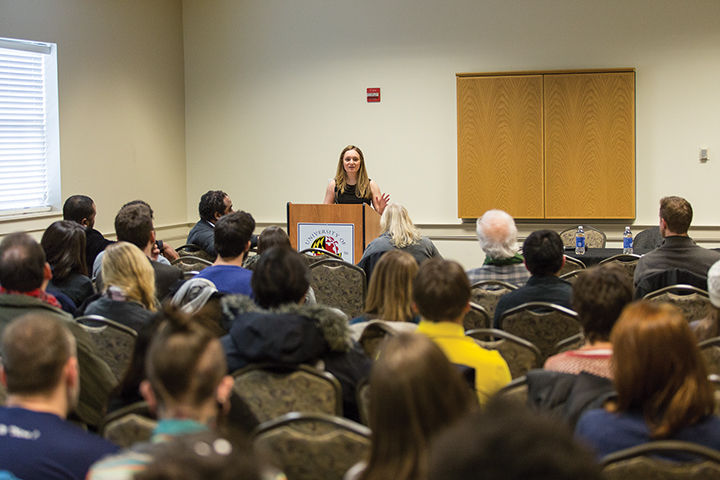
Alice Goffman, author of “On the Run”, speaks about her book and her research to more than 50 people in the Stamp Student Union on Thursday, Feb. 19.
While this country has rid itself of what an urban ethnographer called a “racial caste system,” she told a crowd in Stamp Student Union on Thursday that low-income black men still face discrimination and oppression in the form of pervasive policing and mass incarceration.
Alice Goffman spoke to a crowd of about 65 students and faculty in the Margaret Brent Room about her experiences living in and studying a low-income black neighborhood in Philadelphia as part of the sociology department’s Consortium on Race, Gender and Ethnicity lecture series.
Goffman discussed what she observed and learned in the six years she spent there. She addressed how increased policing and the crackdown on drugs and crime impacted young black men in the neighborhood, which she describes in her book On the Run: Fugitive Life in an American City.
“The U.S. incarceration rate went up by 700 percent from the 1970s to the 2000s,” Goffman said. “Today, black men make up 37 percent of the prison population and are six times more likely to go to prison than white men.”
Her discussion focused on a single family living on Sixth Street, the name she used for the area she studied, and how the “Tough on Crime” movement and the war on drugs impacted their lives.
“On Sixth Street, people learn at a very early age to watch out for the police and to run,” Goffman said.
Goffman described Linda Taylor, whose father had moved to the promising, middle-class Sixth Street before the 1980s hoping to escape the “crowded and run-down ghetto.” But as Taylor grew up, all of the white families moved away, street crime in the neighborhood rose, police presence increased dramatically and she got involved with drugs. The ghetto seemed to have “grown up around” the Taylors, Goffman said.
“Politicians saw the crackdown on drugs as the answer,” Goffman said. “If you think back to that era, there could’ve been a great many solutions, but prison bars is the one we chose.”
Taylor had three sons, all of whom would ultimately end up in jail multiple times for drug possession or assault. Mostly, they were just trying to feed their family and stay away from police, Goffman said. It has become a cycle, she said, and many black men in these neighborhoods end up leading lives in which they are constantly either incarcerated or trying to avoid the police so they don’t end up back in prison.
Goffman said she once heard Chuck Taylor coaching his younger brother Tim on how to avoid the police: “You hear the law coming, you run away from them because whoever they’re looking for, even if it’s not you, nine times out of 10, they’ll book you.”
Krisztian Mazo, a sophomore Spanish major who attended the lecture, said hearing about everything the Taylor family went through was surreal.
“I was just in Philly a week ago, and I feel like there’s so much that people just don’t really notice,” Mazo said. “And we really have nothing to compare it to. Like I grew up in Montgomery County, and we have some bad kids, but what we deal with is nothing like Sixth Street.”
Sophomore business major Thomas Ketelhut said he was impressed by Goffman’s courage and willingness to be a part of such a community and bear witness to the lives of those on Sixth Street. He said it offered a different, valuable perspective.
“I have no real perspective on the kinds of things the people [Goffman described] have to deal with,” Ketelhut said. “I know I grew up with a white, privileged background, and I complain about waking up in the morning. It seems so crazy now.”
Goffman said there has been progress made in the past five years that offers some hope to fixing the problem of mass incarceration and subjugation of low-income black families. Some states, such as New York, California and New Jersey have been lowering incarceration rates and closing prisons while still keeping crime down, and courts across the country are throwing out unwarranted “stop-and-frisk” policies, she said.
Still, she said, the system of governance operating in black neighborhoods is very different from that of other neighborhoods in the country and is actively contributing to a lack of basic rights for black men and an unraveling of social and familial ties, forcing people to live as fugitives.
“I don’t know how many of you walk around every day worried that the police are going to arrest or even more that they are actively looking for you,” Goffman said. “For Tim and Chuck [Taylor] and their friends, this is a basic fact of everyday life.”



